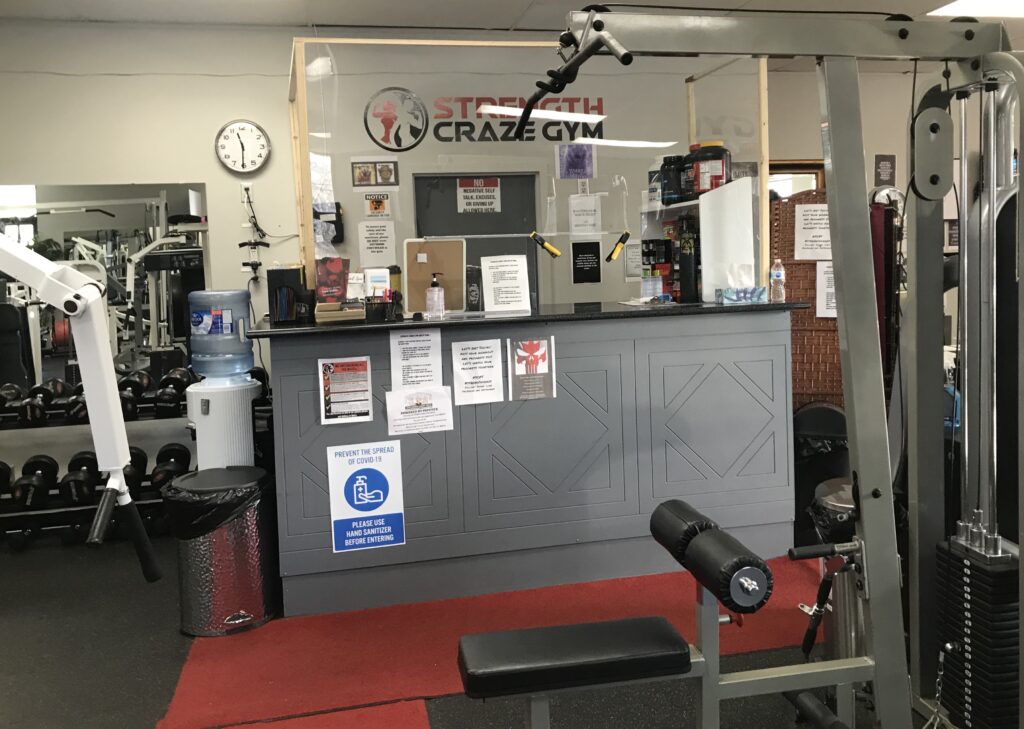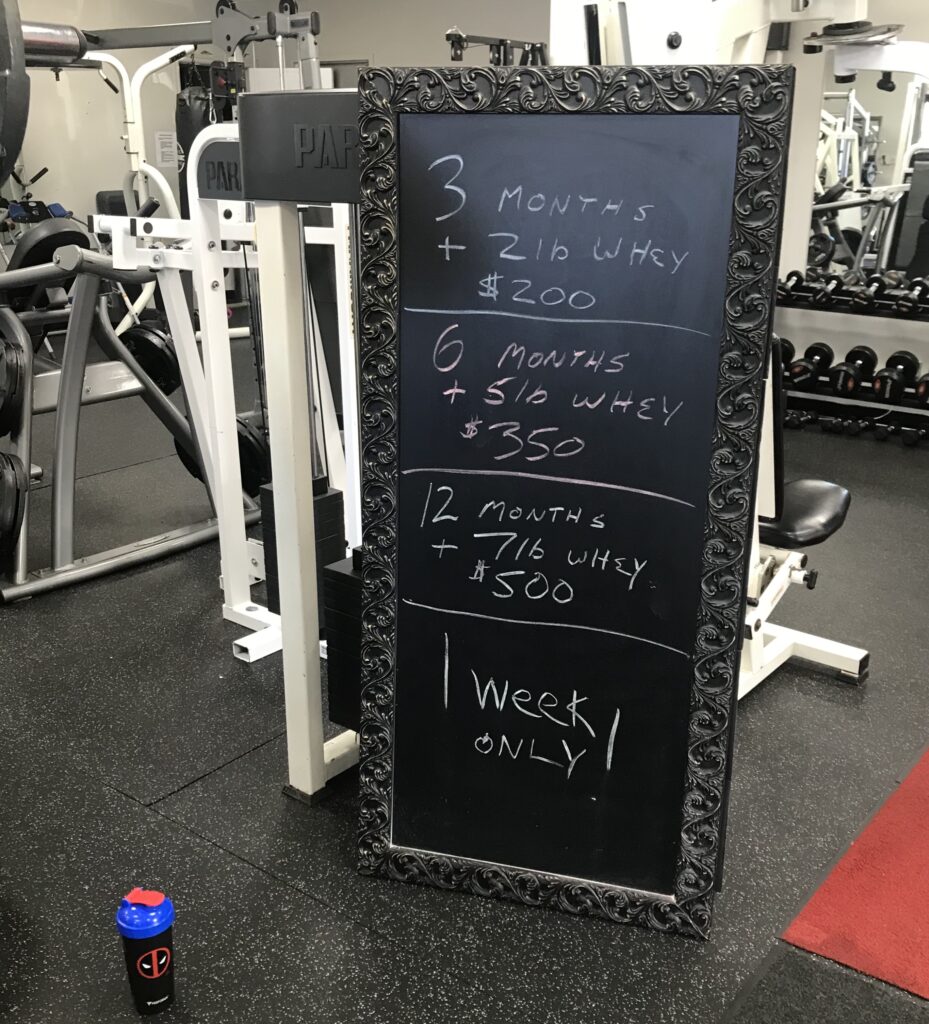In the age of lockdown, Barry and Melissa Jones chose to fight back for their business
Russell Ontario, and the surrounding area are currently home to three gyms. Strength Craze is the oldest of those currently in operation, having opened in 2016. It is also the smallest, and the only gym to offer personal training services alongside its standard facility usage, coming at an elevated fee in comparison. In March, the lockdown to deal with the Covid-19 pandemic forced all gyms into mandatory closure which would eventually last five-months. The economic strain of these income halting measures would eventually lead to the capitulation of JR Fitness, one of the two gyms in Embrun at the time, whose equipment was eventually incorporated into a new gym opened in the fall. The Russell Sports Dome gym, owned and operated by the Prescott Russell municipal government, also survived the lockdown and reopened successfully. Without the backing of a municipal body, how has Strength Craze able to survive the economic closure which claimed so many other small businesses?
Owners Barry and Melissa Jones, a newly-wed couple, attribute their continued success to their ability to innovate, and advertise their business effectively. Prior to the government ordered lockdown taking effect, Mr. Jones, who has worked in and owned gyms since he was 19, reached out to potential customers for personal training. With regards to the pandemic, he learned that people originating from countries plagued with instability had no fear of the pandemic. “I asked, ‘well how come you’re not scared of corona?’ and basically what their answer was ‘well you know, when I grow up, if you heard *whistling, imitating a bomb dropping* then you were worried about s—-. You hear *coughing* … no’” Jones said, likely paraphrasing. The couple insist that the majority of panic around Covid-19 is the result of fear mongering and have staunchly worked to avoid using such tactics in their business.

Within the gym, a few measures have been implemented to limit the spread of the disease. A sign in sheet is present to meet the requirement of limiting guests at any one time, though the location of the gym means that it very rarely surpasses that margin. A newly assembled frame holds up a three walled plexiglass box around the front desk (below, left), cleaning stations fitted with hand-sanitizers and disinfectant sprays are scattered throughout the gym. Mr. Jones says that the gym is, and always has been, “clean as a whistle”. Since the onset of the pandemic they have upped their usual cleaning and enforced guests to clean their own equipment, all using industrial cleaning products which, according to Jones, “nothing could survive”. As a result, post-lockdown measures have had little effect on their business operations. They still run 20 to 30 sessions of personal training a day, at $60 each, which serves as the majority of their income and do not violate any mandatory safety measures.

Their methods of keeping afloat during the lockdown are what the Jones’ are most proud of. As they note, “you were allowed to curbside pickup”, an observation which led them to partner with Popeyes, a well-established supplement depot. “We’d have people come in and pick up their protein. And now we have promos where we’re giving them away as an add on” (promos pictured, left), this referring to a deal currently available for free protein powder as an inclusion with a membership. As for operations, taking from the labelling of the LCBO and other alcohol sales as an essential service for those afflicted with addiction issues, they remained open for clients on call. “Clients can call me, especially ones that have high anxiety, PTSD, stress disorders, they can call me, and I’ll train them.” He added, “I had reasons to be in here, special kinds of people you could work with”. They spoke of a plethora of mental health issues accompanying the virus, which they were specifically attempting to mitigate with their toned-down services earlier this year. “A lot of people if they don’t do their exercise, they do this instead, a lot of suicides have been happening”.
The Jones’ were heavily critical of other gym owners unsure how to react to the pandemic, “if you’re scared, you don’t know what to do, you should quit, if you have no ingenuity, no creativity”. For them, getting new clients at the gym was as simple as picking up the phone “We added value to what we provide” Mr. Jones said, referring to both the supplement offers and their personal training services. As to whether their advertising has been effective, Joseph Doyle (pictured below, left), a recently registered patron of the gym, was able to elaborate. Doyle, who began using the gym only after the onset of the pandemic, spoke of his lack of fear in visiting now. “I was less consistent [before the pandemic]” he informed, “I started a relationship and I wanted to look a bit better for the woman”.
As to whether the pandemic had posed any mental roadblocks to his new habits, he wavered briefly, but was overall quite succinct in his response, “well during the pandemic it was mostly things I created in my own head” he said “I think it’s more of an opinion based thing, I have no fear of it. If somebody else is high risk or they don’t feel comfortable doing it, that’s up to them. But its also up to me to decide whether I want to go or not”. He and Jones are at a consensus that gyms have been unnecessarily vilified by health ministers, though Doyle partially attributes the absence of cases, which Jones boasted of to the smaller number of visitors at this gym compared to others. However, he noted “it’s no different than going out to the grocery store at this point”.

As to whether Jones’ advertisement and perspective on the pandemic has played a role in shaping his own, Doyle commented “I think for the people, in our society we have a higher obesity rate … maybe a personal trainer could be someone who would change their life”. His assertion is correct, Canada ranks among the highest rates of obesity in the world, with approximately 29% of Canadians overweight or obese, according to World Population Review. He concurs with the Joneses, that public health is served, rather than threatened, by gyms remaining open.
Barry and Melissa Jones, while some might be critical of their outlook on the pandemic, have certainly adapted to its circumstances, specifically because of their unabashed rejection of normalcy. As a result of their ideas, they have remained in business, and according to them, are still making modest profits when compared to before the pandemic. Their position to emphasize the improvement of mental and physical health, even in an era of waning public health, is well circulated, being shared even by many clients, a consensus which has been pivotal to their continued success.
